Travel Tech Essentialist #128: Discretionary Premiumization
The idea behind discretionary premiumization is to gain a competitive advantage by excelling in one or two specific areas because our minds naturally focus on the outliers - the things that are bizarrely good. It’s about making strategic choices to deliver exceptional value where it matters most to a target audience. In #5 you can see how this relates to the hotel industry, and it’s good food for thought on how other travel categories could benefit from applying discretionary premiumization.
Pattern sponsors this newsletter:
Pattern enables online businesses to provide their customers with personalized insurance products powered by its innovative platform. Enhancing customer experience in bookings and registrations, Pattern learns consumer preferences through machine learning to deliver the most meaningful, tailor-made propositions. Customers benefit from a single integration to offer multiple products that are controlled via a no-code backend and optimized conversions. Contact Pattern to learn more.
0. The most clicked link in the previous newsletter
The most clicked link in Travel Tech Essentialist #127 was the tourism appeal of secondary cities as a better way to sample daily life beyond the tourist bubble.
1. The Big Three
Last week was a big week for the online travel sector, with Expedia, Booking, and Airbnb reporting very solid Q3 results, showing a resilient travel demand.
2. Expedia B2B thrives
Expedia revenue in Q3 2023 grew 9%, primarily driven by the remarkable 26% increase in Expedia's B2B business, while the B2C segment experienced a more modest 4% growth. B2B’s share of total revenues has risen from 17% in Q3 2021 to 22% in Q3 2022 to 25% in Q3 2023. Its B2B segment is comprised primarily of Expedia Partner Solutions (operates private label and co-branded programs) as well as Egencia, Expedia Cruises and Traveldoo.
3. Many travel stocks soar, while metasearch and SPAC-listed companies struggle
In the year-to-date stock price performance as of November 3, 2023, several travel companies have exhibited impressive growth, outperforming market indices. RateGain led the way with gains of 140%. In contrast, metasearches (Tripadvisor and Trivago) and, notably, SPAC-listed companies (Inspirato, Vacasa, and Sonder) show significant declines. The NASDAQ and EURO STOXX indices saw gains of 30% and 8%, respectively.
4. New and improved job board
I launched a new and improved job board that I think you will like. There are currently 641 jobs from 12 great travel companies (and growing) that are looking to hire for positions around the world. All jobs are continuously and automatically updated, so everything you see is current.
→ If you're a candidate seeking new opportunities or are simply curious about what's available, check out the new job board. You can also set up job alerts to be notified as soon as jobs that match your preferences (such as location, company size, and function) become available.
→ If you’re a company and want to be included in the new job board, please complete this 1-minute form.
5. The differentiation opportunity of 'discretionary premiumization'
Rory Sutherland (Vice Chairman of Ogilvy and the founder of its behavioral science practice) discusses his perspective on the hotel market, highlighting the Moxy Hotel brand. He’s annoyed by the polarized options in the hotel industry, where you either pay a lot for everything or very little for almost nothing. Moxy Hotels, however, has adopted a clever approach. The rooms are very basic and tiny, but they excel at few and select things: a great TV, excellent Wi-Fi, very well-located locations, and vibrant communal areas reminiscent of a WeWork space, with a 24-hour coffee bar and a drinks bar where you can also check in.
Sutherland views Moxy Hotels as an example of "discretionary premiumization," where a brand chooses one or two standout features and excels in them, rather than overloading with unnecessary amenities. He suggests that many brands, especially those in commodity markets, can benefit from this approach. By excelling in one or two standout features, a brand can create a unique selling point that people remember. What people notice are the outliers, the things that are exceptionally good, rather than the standard product attributes. Read +.
6. An astrophysicist comes up with a better way to board airplanes
Jason Steffen is an astrophysicist who studies dark matter and planets orbiting distant stars. In his spare time, he also works on another of the universe’s deepest mysteries: the best way to board airplanes. He applied the computing methods he uses for his astrophysics work and coded an optimization algorithm for boarding a plane, which led him to come up with his counterintuitive Steffen method. It’s a method that is highly optimized until you take into account a few of the human and business variables that airlines cannot ignore. Read +.
If you want to take a look at how aviation insiders and enthusiasts are reacting to the Steffen method, read the comments section of Jay Sorensen’s post.
7. Life-seeing vs sightseeing
Travelers of all generations are seeking more experiences that are true to local culture, leading to an increase in neighborhood tourism. Similar to the tourism appeal of secondary cities (see #0 above) but on a city level. DMCs such as the Vienna Tourism Board are helping travel advisors and tour operators with initiatives to encourage neighborhood tourism. Read +.
8. A visual history of paper boarding passes
A visual history of how the paper boarding pass has changed from the 1950s to the present, and read why so many people have saved boarding passes for decades.
9. Don’t split the difference
Chris Voss, the former lead international hostage negotiator for the FBI, authored the book 'Never Split the Difference' in 2016, in which he offers counterintuitive tactics and strategies that can improve negotiating outcomes in both our professional and personal lives. While entrepreneurs typically do not find themselves negotiating matters of life and death with criminals, there is value in learning from someone who has. Voss emphasizes the importance of 'tactical empathy,' which he describes as 'emotional intelligence on steroids,' as a key to his success. He also explores methods for using subtle verbal and nonverbal communication to understand and influence the mental states of the other party. Notably, he references the 7%-38%-55% rule, which suggests that only 7% of a message is based on words, while 38% comes from the tone of voice and 55% from the speaker's body language and facial expressions. This post provides a 10-point summary of Chris Voss's advice.
10. Where are hotel rates expected to climb the fastest in 2024?
The Hotel Monitor 2024 report, prepared by American Express Global Business Travel Consulting, projects hotel price changes in over 80 cities, and compiled a list of the major global business centers with the highest anticipated year-over-year rate increases for 2024. Buenos Aires tops the list with a projected 17.5% year-over-year rate increase.
PS.
Thanks to Dan Christian for inviting me to his Travel Trends podcast. If you want to take a listen, here’s the link.
Travel Investor Network
Travel Investor Network is a private platform launched by Travel Tech Essentialist for investors and innovators to discover innovative travel startups. If you are a startup looking to raise a round (from pre-seed to Series D), maybe I can help (for free). Please start by completing this form.
If you like Travel Tech Essentialist, please consider sharing it with your friends or colleagues. If you’re not yet subscribed, you can do so here:
Thanks for trusting me with your inbox,
Mauricio








